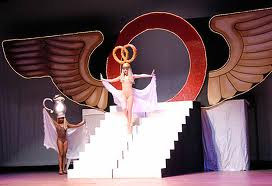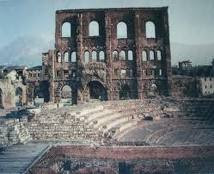Was known as 200 BC in the Golden Age of Greek Theatre Arts - the period around 600 BC. Athens was the focal point for the arts thriving.
The Center for political and military history of the great emperors, soldiers, philosophers, writers, poets and actors.
Organized annually plays in the theater of Dionysia. And songs in praise of the first god of wine and fertility, Dionysus. Out of them, poetry, Aristotle outstanding. He was a key element of a tragedy that was the inspiration behind the tragic stories. Put another poet Arion choir singing, which was known as the poem is full of enthusiasm. Later in the choir became an integral part of the Greek Theatre along with the commentators, actors and narrators who were also part of a team chorus. In some of the chorus plays a different character separately. They all coincided with each other to draft a single entity instead of a group. At the beginning of the choir consists of twelve singing and dancing, known as participants Choreutai. Later was the growing number of groups of fifteen and two of seven, known as the Hemichoria, made with the singer known as Koryphaios.
Plays were written by Thespis at the beginning with one actor who enacted different characters by wearing different masks. That interact with the choir, who told some parts of the story and sang when appropriate. The subjects of his play in the tragedy and God Dionysus. The representative of Aeschylus second, followed by Sophocles, which is representative of the third. This has increased the complexity of the story and open the horizons are being considered in other Greek mythological figures. This was also when the commander presented the choir. He was responsible for interaction with the actors on the stage with the audience and also expressed their view and summarize. In some cases, the interaction in the form of song and at other times spoke directly. And the rest of the choir sang along in the background and clear on the main theme.
And thus became the symbol of two masks, or Greek Theater Theatron. It was a gleeful smile and an expression representing the comic side of the play and another carrying the mask and the sad expression that represents the tragic aspect of the play. Of BC, 500s, and theaters became more dignity and pride of the Athenian culture. The first scene of the famous theater of Dionysus. Held annual competitions where the implementation of three tragic plays and reward the best play. Play only in the competition between comedy BC 430s.
In the fourth century BC, King Alexander attacked Athens, which led to the Peloponnesian War. And then when the power of Athens began to deteriorate. Despite the threat to the traditions of Greek drama, it is still alive and passed to the Hellenistic period. It was at this period when the comedian came to the theater its full form, which is reflected on the lives of ordinary citizens. Story of the plays were never mixed, you do not interfere with any tragedy, comedy, and vice versa. Menander and writer who reached fame during this period.
Became the three main elements of the Theater Orchestra, a knife and the public. Platform performed by artists and the implementation of the choir was known as the orchestra or dancing place. At other times was used to perform religious rites. The knife was a huge rectangular building behind the orchestra. Originally it was a simple hut or tent used as a behind the scenes. Roles have changed their uniforms here and it was used for religious purposes as well. But taken at a later time in the form of company structure with stone doors that opened 2-3 in the orchestra. Been done to these images, the structure that was used as the background of the play and this is the way to a knife-term came into existence. Later in the structure of the last named Proskene was also held in front of a knife that was supposed to perform exclusively of representatives. And sat in the audience on a tour of ascending stairs form a unit of the seats. Therefore the form of the mountain, which is being sculptured in the whole structure is important.
Theater and the arts that emerged during that era are reflected in the plays of the day in all parts of the world. Of plays written in all that time playing for tragedians such as Aeschylus, Sophocles and Euripides, and Aristophanes plays comedian who became famous in the history of the Golden Greek Art. The work has taken a step further by Plautus and Terence.










No comments:
Post a Comment